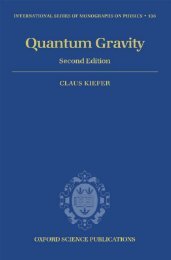- Page 3 and 4: Quantum Gravity Mathematical Models
- Page 5 and 6: CONTENTS Preface ..................
- Page 7 and 8: Contents vii 1.2. Why topology chan
- Page 9: Contents ix 7.3. Diffeomorphism inv
- Page 13 and 14: Preface xiii In the search for quan
- Page 15 and 16: Preface xv arguments from string th
- Page 17 and 18: Quantum Gravity B. Fauser, J. Tolks
- Page 19 and 20: Quantum Gravity — A Short Overvie
- Page 21 and 22: 2. Quantum general relativity Quant
- Page 23 and 24: Quantum Gravity — A Short Overvie
- Page 25 and 26: Quantum Gravity — A Short Overvie
- Page 27 and 28: Quantum Gravity — A Short Overvie
- Page 29 and 30: Quantum Gravity — A Short Overvie
- Page 31 and 32: 16 Claus Lämmerzahl compared with
- Page 33 and 34: 18 Claus Lämmerzahl In the case th
- Page 35 and 36: 20 Claus Lämmerzahl The two postul
- Page 37 and 38: 22 Claus Lämmerzahl as granted. Si
- Page 39 and 40: 24 Claus Lämmerzahl no other field
- Page 41 and 42: 26 Claus Lämmerzahl per turn what
- Page 43 and 44: 28 Claus Lämmerzahl [77, 78]. This
- Page 45 and 46: 30 Claus Lämmerzahl through astrop
- Page 47 and 48: 32 Claus Lämmerzahl will have same
- Page 49 and 50: 34 Claus Lämmerzahl [23] K. Breche
- Page 51 and 52: 36 Claus Lämmerzahl [58] J. Ehlers
- Page 53 and 54: 38 Claus Lämmerzahl [92] L. Iorio.
- Page 55 and 56: Quantum Gravity B. Fauser, J. Tolks
- Page 57 and 58: Time Paradox in Quantum Gravity 43
- Page 59 and 60: Time Paradox in Quantum Gravity 45
- Page 61 and 62:
Time Paradox in Quantum Gravity 47
- Page 63 and 64:
Time Paradox in Quantum Gravity 49
- Page 65 and 66:
Time Paradox in Quantum Gravity 51
- Page 67 and 68:
Time Paradox in Quantum Gravity 53
- Page 69 and 70:
Time Paradox in Quantum Gravity 55
- Page 71 and 72:
Time Paradox in Quantum Gravity 57
- Page 73 and 74:
Time Paradox in Quantum Gravity 59
- Page 75 and 76:
Quantum Gravity B. Fauser, J. Tolks
- Page 77 and 78:
Differential Geometry in Non-Commut
- Page 79 and 80:
Differential Geometry in Non-Commut
- Page 81 and 82:
Differential Geometry in Non-Commut
- Page 83 and 84:
Differential Geometry in Non-Commut
- Page 85 and 86:
Differential Geometry in Non-Commut
- Page 87 and 88:
Differential Geometry in Non-Commut
- Page 89 and 90:
Differential Geometry in Non-Commut
- Page 91 and 92:
78 S. Majid functional path integra
- Page 93 and 94:
80 S. Majid In general a given alge
- Page 95 and 96:
82 S. Majid and its curvature (defi
- Page 97 and 98:
84 S. Majid using our previous nota
- Page 99 and 100:
86 S. Majid 3.1. Cotorsion and weak
- Page 101 and 102:
88 S. Majid Next, any connection ω
- Page 103 and 104:
90 S. Majid 1. H a Hopf algebra coa
- Page 105 and 106:
92 S. Majid In other words, apart f
- Page 107 and 108:
94 S. Majid 5. Quantum gravity on f
- Page 109 and 110:
96 S. Majid for Z 4 as a model of S
- Page 111 and 112:
98 S. Majid to a deeper conceptual
- Page 113 and 114:
100 S. Majid [M12] S. Majid. Noncom
- Page 115 and 116:
102 Daniele Oriti so on the one han
- Page 117 and 118:
104 Daniele Oriti included in the (
- Page 119 and 120:
106 Daniele Oriti than a smooth man
- Page 121 and 122:
108 Daniele Oriti spin foam models.
- Page 123 and 124:
110 Daniele Oriti obtained gluing t
- Page 125 and 126:
112 Daniele Oriti depends on the gr
- Page 127 and 128:
114 Daniele Oriti actions, and para
- Page 129 and 130:
116 Daniele Oriti is certainly need
- Page 131 and 132:
118 Daniele Oriti For the propagato
- Page 133 and 134:
120 Daniele Oriti irreps used) and
- Page 135 and 136:
122 Daniele Oriti • What is λ? I
- Page 137 and 138:
124 Daniele Oriti is currently in p
- Page 139 and 140:
126 Daniele Oriti [35] K. Krasnov,
- Page 141 and 142:
128 M. Paschke spontaneously break
- Page 143 and 144:
130 M. Paschke 2. Classical spectra
- Page 145 and 146:
132 M. Paschke 4. It now remains to
- Page 147 and 148:
134 M. Paschke Remark 2.3. Related
- Page 149 and 150:
136 M. Paschke We now want to descr
- Page 151 and 152:
138 M. Paschke On the other hand we
- Page 153 and 154:
140 M. Paschke 3. The spectral acti
- Page 155 and 156:
142 M. Paschke • We should stress
- Page 157 and 158:
144 M. Paschke and don’t have def
- Page 159 and 160:
146 M. Paschke on the common domain
- Page 161 and 162:
148 M. Paschke contains a full Cauc
- Page 163 and 164:
150 M. Paschke [24] H.-J. Matschull
- Page 165 and 166:
152 Romeo Brunetti and Klaus Freden
- Page 167 and 168:
154 Romeo Brunetti and Klaus Freden
- Page 169 and 170:
156 Romeo Brunetti and Klaus Freden
- Page 171 and 172:
158 Romeo Brunetti and Klaus Freden
- Page 173 and 174:
Quantum Gravity B. Fauser, J. Tolks
- Page 175 and 176:
Mapping-Class Groups 163 tensors of
- Page 177 and 178:
Mapping-Class Groups 165 respect to
- Page 179 and 180:
Mapping-Class Groups 167 these surf
- Page 181 and 182:
Mapping-Class Groups 169 2. 3-Manif
- Page 183 and 184:
Mapping-Class Groups 171 S 2 σ 1 S
- Page 185 and 186:
Mapping-Class Groups 173 Let us foc
- Page 187 and 188:
Mapping-Class Groups 175 b.) G = D
- Page 189 and 190:
Mapping-Class Groups 177 and [21].
- Page 191 and 192:
Mapping-Class Groups 179 H ϕ T 1 T
- Page 193 and 194:
Mapping-Class Groups 181 where θ =
- Page 195 and 196:
Mapping-Class Groups 183 be represe
- Page 197 and 198:
Mapping-Class Groups 185 manifold,
- Page 199 and 200:
Mapping-Class Groups 187 between S
- Page 201 and 202:
Mapping-Class Groups 189 P S θ =co
- Page 203 and 204:
Mapping-Class Groups 191 Equivalent
- Page 205 and 206:
Mapping-Class Groups 193 clearly ju
- Page 207 and 208:
Mapping-Class Groups 195 Propositio
- Page 209 and 210:
References Mapping-Class Groups 197
- Page 211 and 212:
Mapping-Class Groups 199 [41] Allen
- Page 213 and 214:
Mapping-Class Groups 201 [76] Rafae
- Page 215 and 216:
204 Ch. Fleischhack such an emergen
- Page 217 and 218:
206 Ch. Fleischhack 4. Configuratio
- Page 219 and 220:
208 Ch. Fleischhack h A ∈ A. Now,
- Page 221 and 222:
210 Ch. Fleischhack 6. Holonomy-flu
- Page 223 and 224:
212 Ch. Fleischhack Let us denote t
- Page 225 and 226:
214 Ch. Fleischhack operators on L
- Page 227 and 228:
216 Ch. Fleischhack 8.3. Comparison
- Page 229 and 230:
218 Ch. Fleischhack References [1]
- Page 231 and 232:
Quantum Gravity B. Fauser, J. Tolks
- Page 233 and 234:
TQFT as TQG 223 In section 2 we int
- Page 235 and 236:
TQFT as TQG 225 where A is the gaug
- Page 237 and 238:
TQFT as TQG 227 were also obtained,
- Page 239 and 240:
TQFT as TQG 229 to the cone z1 2 +
- Page 241 and 242:
TQFT as TQG 231 2. Quantum group (o
- Page 243 and 244:
TQFT as TQG 233 of gravitation if W
- Page 245 and 246:
TQFT as TQG 235 [16] I. Smith, R¿
- Page 247 and 248:
238 Thomas Mohaupt By the analogy t
- Page 249 and 250:
240 Thomas Mohaupt should be compar
- Page 251 and 252:
242 Thomas Mohaupt 2n+2 , then, al
- Page 253 and 254:
244 Thomas Mohaupt 3. Beyond the ar
- Page 255 and 256:
246 Thomas Mohaupt where F Υ = ∂
- Page 257 and 258:
248 Thomas Mohaupt Using this one e
- Page 259 and 260:
250 Thomas Mohaupt moduli are separ
- Page 261 and 262:
252 Thomas Mohaupt where F KL denot
- Page 263 and 264:
254 Thomas Mohaupt [53, 47] S macro
- Page 265 and 266:
256 Thomas Mohaupt Hence these blac
- Page 267 and 268:
258 Thomas Mohaupt Q =(q, p) ∈ Γ
- Page 269 and 270:
260 Thomas Mohaupt References [1] L
- Page 271 and 272:
262 Thomas Mohaupt [60] R. Dijkgraa
- Page 273 and 274:
264 Felix Finster For clarity, we f
- Page 275 and 276:
266 Felix Finster This variational
- Page 277 and 278:
268 Felix Finster induced on the sp
- Page 279 and 280:
270 Felix Finster is singular (for
- Page 281 and 282:
272 Felix Finster 6. Outlook: The c
- Page 283 and 284:
274 Felix Finster discreteness of s
- Page 285 and 286:
276 Felix Finster point of view to
- Page 287 and 288:
278 Felix Finster to our above cons
- Page 289 and 290:
280 Felix Finster material on the s
- Page 291 and 292:
Quantum Gravity B. Fauser, J. Tolks
- Page 293 and 294:
Gravitational Waves and Energy Mome
- Page 295 and 296:
Gravitational Waves and Energy Mome
- Page 297 and 298:
Gravitational Waves and Energy Mome
- Page 299 and 300:
Gravitational Waves and Energy Mome
- Page 301 and 302:
Quantum Gravity B. Fauser, J. Tolks
- Page 303 and 304:
Asymptotic Safety in QEG 295 The as
- Page 305 and 306:
Asymptotic Safety in QEG 297 symbol
- Page 307 and 308:
Asymptotic Safety in QEG 299 the pr
- Page 309 and 310:
Asymptotic Safety in QEG 301 bounda
- Page 311 and 312:
Asymptotic Safety in QEG 303 This l
- Page 313 and 314:
Asymptotic Safety in QEG 305 with G
- Page 315 and 316:
Asymptotic Safety in QEG 307 Thus t
- Page 317 and 318:
Asymptotic Safety in QEG 309 parame
- Page 319 and 320:
Asymptotic Safety in QEG 311 of asy
- Page 321 and 322:
Asymptotic Safety in QEG 313 [39] J
- Page 323 and 324:
316 Harald Grosse and Raimar Wulken
- Page 325 and 326:
318 Harald Grosse and Raimar Wulken
- Page 327 and 328:
320 Harald Grosse and Raimar Wulken
- Page 329 and 330:
322 Harald Grosse and Raimar Wulken
- Page 331 and 332:
324 Harald Grosse and Raimar Wulken
- Page 333 and 334:
326 Harald Grosse and Raimar Wulken
- Page 335 and 336:
328 Index see also Bogomol’nyi-Pr
- Page 337 and 338:
330 Index fine structure constant,
- Page 339 and 340:
332 Index spinorial, 173, 190 mappi
- Page 341 and 342:
334 Index renormalizable nonperturb
- Page 343:
336 Index list of experiments, 19 v


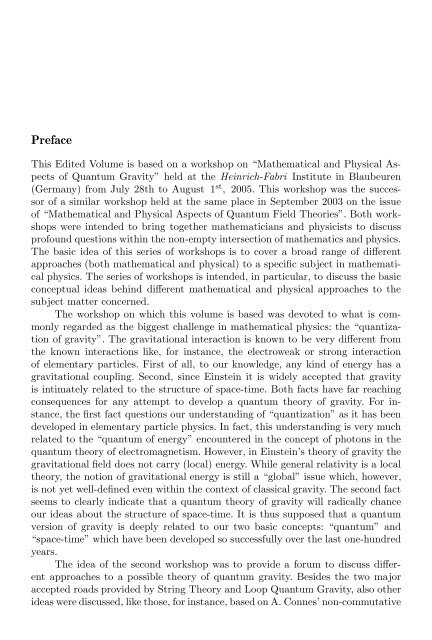
![arXiv:1001.0993v1 [hep-ph] 6 Jan 2010](https://img.yumpu.com/51282177/1/190x245/arxiv10010993v1-hep-ph-6-jan-2010.jpg?quality=85)
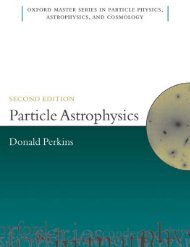
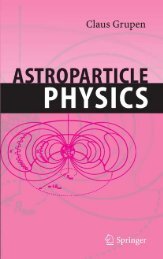
![arXiv:1008.3907v2 [astro-ph.CO] 1 Nov 2011](https://img.yumpu.com/48909562/1/190x245/arxiv10083907v2-astro-phco-1-nov-2011.jpg?quality=85)
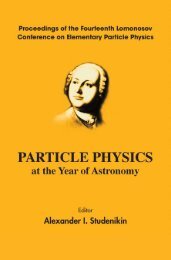
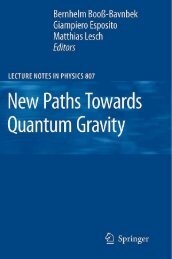
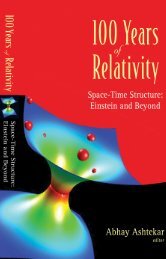
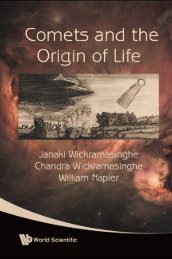
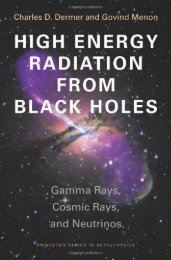
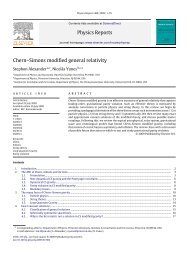
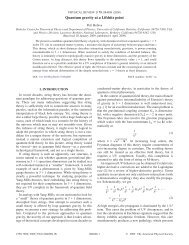
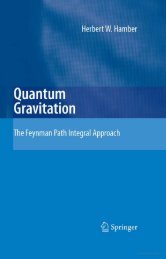
![arXiv:1002.4928v1 [gr-qc] 26 Feb 2010](https://img.yumpu.com/41209516/1/190x245/arxiv10024928v1-gr-qc-26-feb-2010.jpg?quality=85)
![arXiv:1206.2653v1 [astro-ph.CO] 12 Jun 2012](https://img.yumpu.com/39510078/1/190x245/arxiv12062653v1-astro-phco-12-jun-2012.jpg?quality=85)
